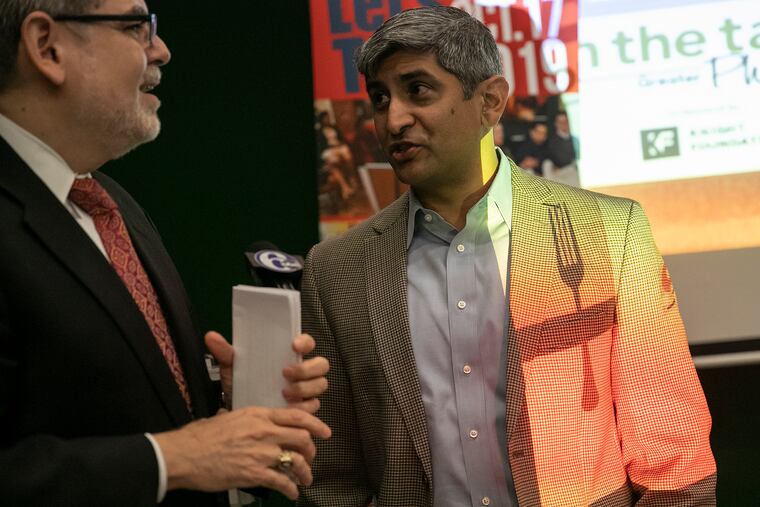Philadelphia can lead the way in restoring civility to the national conversation | Opinion
In recent years, our city has established successful templates for civil community conversation that we need now more than ever.

We are facing a national emergency. It’s not only COVID-19, the lack of affordable housing, or an economic collapse. We have lost the ability to talk with one another. Unless we commit to rebuilding this basic skill set, our country simply cannot address any other challenges.
The first presidential debate exemplified this deficiency. Talking past one another, interruption in the course of civil debate, and intransigence with accepting norms of public discourse in a forum as widely watched as a presidential debate suggests that this type of behavior is acceptable and that we can standardize it in our own lives. If a president can do it, why can’t we?
The societal permeation of this behavior is corrosive. It is debilitating to the basic operations of democracy, which requires ideas to be discussed and vetted. It also furthers the perception in our respective political silos that the chasms are too wide, the differences too deep to cross through conversation.
» READ MORE: Biden and Trump supporters gather in Gettysburg
Presidential candidate Joe Biden attempted to reset the tone in his Oct. 6 speech in Gettysburg, when he pointed to the consequences of continued division. But the outcome of the presidential election should not dictate Americans’ own capacity to commit to civil society and its necessary ingredients. The power to change the narrative lies within us, and we have already proved that our city is adept at leading the way.
Over the last several years, Philadelphia has established a number of successful templates for civil community conversation, including the Philadelphia Foundation-supported On The Table initiative and the Knight Foundation-supported Breaking Bread, Breaking Barriers. These conversations have taken place in venues ranging from church basements to neighborhood parks. They have transcended race, religion, income, language proficiency, and many of the other artificial barriers we erect to separate ourselves. And they have consistently demonstrated that when we allow the noise to dissipate, and the heat of the moment to cool, we can sit across the table and find some sense of common purpose despite divergent worldviews.
As the former general manager of Reading Terminal Market, I worked with a number of community-based organizations to foster the Breaking Bread, Breaking Barriers project, a three-times-a-year community dialogue project. Our premise was simple: We asked our participants from diverse communities, who did not know one another, to come together and learn about one another by sharing their respective cuisines. Leveraging food’s power as a common denominator, participants then engaged in post-dinner discussions to build the foundation for lasting relationships.
Over three years, I joined Syrian American refugees to dine and converse with longtime residents of Northeast Philadelphia. I saw African immigrants and African American residents of Southwest Philadelphia discover the commonalities within cuisines that evolved an ocean apart, and an extraordinary diaspora of South Philadelphia residents coalesce to discuss the future of their shared common space, FDR Park.
» READ MORE: As anti-Semitism rises, Philadelphia must find new ways to promote community and civility | Opinion
Despite the different backgrounds at the tables, these conversations that ultimately hundreds of Philadelphians participated in were civil, enlightening, and heartening. They allowed folks to interact and learn about one another through social events that would not have likely happened otherwise. I believe the spirit of these conversations was best captured by a gentleman participating in a Germantown dinner who stated: “If you are curious enough, differences can bring people together.”
Just as we do not need to wait for the election results, we also do not need a formal series like Breaking Bread to engage in the type of dialogue our communities are in dire need of. The power to reach out, extend a hand, discover something you may not know about your neighbors is entirely in our own hands.
While it may be a challenge through the course of the pandemic to facilitate face-to-face conversations with those outside our immediate bubbles, COVID-19 too shall pass. Philadelphians can continue to lead the way in envisioning what kind of community we want when the pandemic does subside. Will it rely on coarse public comments and social media rants to communicate, or do we fall back to the understanding that we are all human beings with ultimately similar interests and more in common than we think? The consequences of choosing the former are too great to bear. Let us choose a path toward civil discourse.
Anuj Gupta is a public space fellow with the James S. and John L. Knight Foundation and was a Biden for President delegate to this year’s Democratic National Convention.